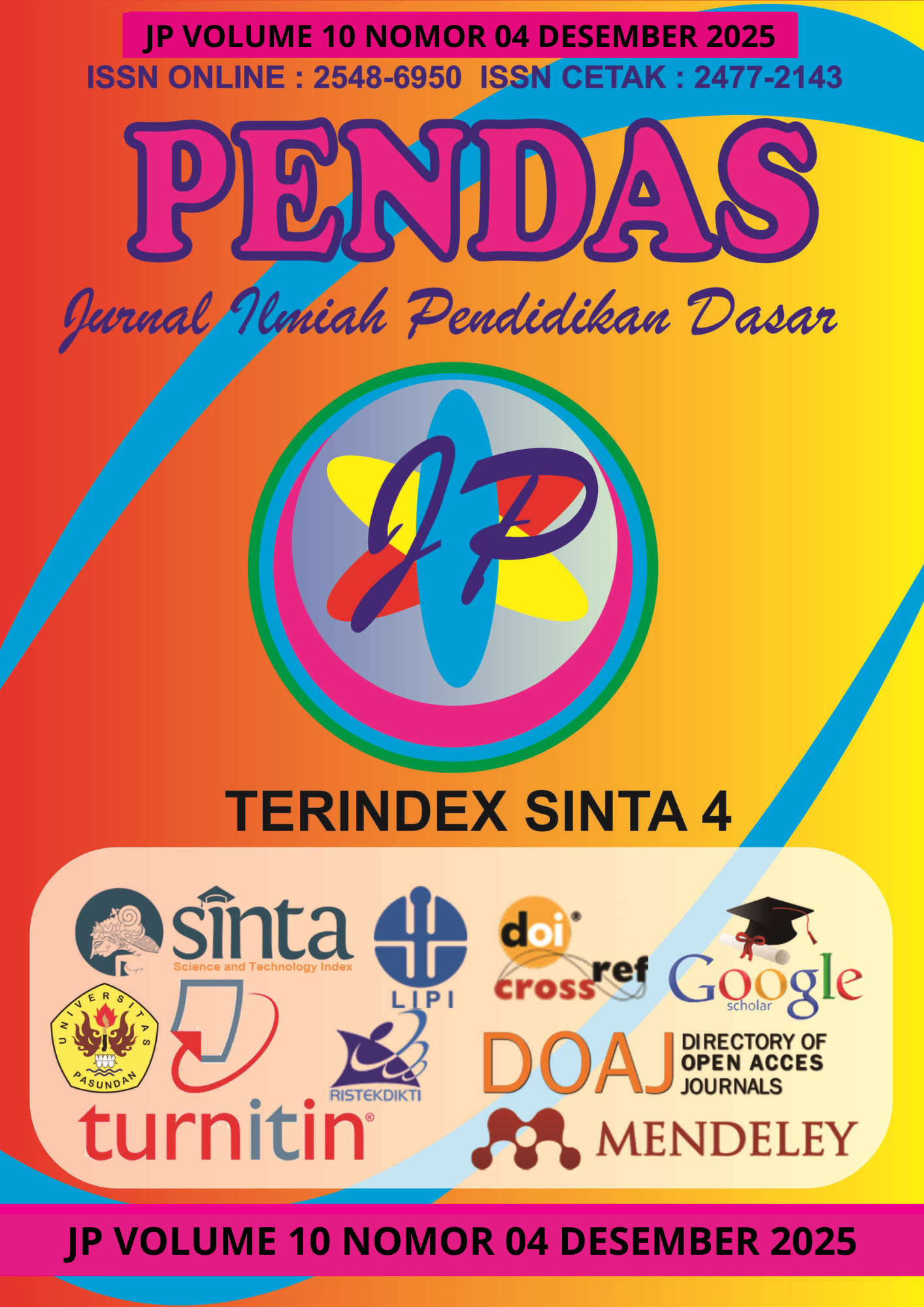MODEL PEMBELAJARAN BERBASIS KEARIFAN LOKAL SULAWESI SELATAN UNTUK MENINGKATKAN PENGEMBANGAN KETERAMPILAN BERBICARA ANAK MELALUI KELONG, SASTRA TUTUR, DAN MANTRA
DOI:
https://doi.org/10.23969/jp.v10i04.34090Keywords:
Speaking skills, local wisdom, kelong, oral literature, mantras, South SulawesiAbstract
Speaking skills are the primary foundation for children's language development and a crucial instrument for interdisciplinary learning. In Indonesia, children's speaking skills, particularly at the elementary school level, still face serious challenges due to the dominance of text-based learning, the lack of space for oral expression, and the low utilization of local cultural contexts in learning. South Sulawesi has a legacy of local wisdom in the form of kelong (Bugis-Makassar folk songs), oral literature (folk tales, fairy tales, and advice), and mantras (spiritual rhythmic utterances) that serve as a medium for transmitting values, a means of traditional education, and a vehicle for communication training. These oral traditions have great potential to support children's speaking skills through rhythm, intonation, vocabulary, and authentic communicative expression. This study aims to develop a learning model based on local wisdom in South Sulawesi to improve children's speaking skills. The research method uses a Research and Development (R&D) approach with a modification of the Borg & Gall model. The study subjects involved 60 fourth-fifth grade students in two regencies, Bone and Gowa, with teachers acting as facilitators. Data were collected through speaking skills tests, classroom observations, interviews, and questionnaires, then analyzed using quantitative and qualitative approaches. The results showed significant improvements in aspects of speaking fluency, vocabulary mastery, public speaking courage, and children's expressive abilities. This study concludes that the integration of kelong, oral literature, and mantras into learning serves not only as a pedagogical strategy but also as an effort to preserve regional culture. The research's contribution lies in developing a culture-based learning model that can be replicated in similar contexts, as well as in strengthening children's oral literacy amidst the challenges of globalization and cultural homogenization.
Downloads
References
Abidin, Y. (2012). Pembelajaran bahasa berbasis karakter. Refika Aditama.
Aitchison, J. (2012). Words in the mind: An introduction to the mental lexicon (4th ed.). Wiley-Blackwell.
Ary, D., Jacobs, L. C., Sorensen, C., & Walker, D. (2018). Introduction to research in education (10th ed.). Cengage Learning.
Borg, W. R., & Gall, M. D. (1989). Educational research: An introduction (5th ed.). Longman.
Burns, A., & Seidlhofer, B. (2002). Speaking and pronunciation. In N. Schmitt (Ed.), An introduction to applied linguistics (pp. 211–232). Oxford University Press.
Creswell, J. W., & Creswell, J. D. (2018). Research design: Qualitative, quantitative, and mixed methods approaches (5th ed.). Sage.
Crystal, D. (2010). The Cambridge encyclopedia of language (3rd ed.). Cambridge University Press.
Dardjowidjojo, S. (2003). Psikolinguistik: Pengantar pemahaman bahasa manusia. Yayasan Obor Indonesia.
Ellis, R. (2003). Task-based language learning and teaching. Oxford University Press.
Finochiaro, M., & Brumfit, C. (1983). The functional-notional approach: From theory to practice. Oxford University Press.
Gay, L. R., Mills, G. E., & Airasian, P. (2011). Educational research: Competencies for analysis and applications (10th ed.). Pearson.
Hymes, D. (1972). On communicative competence. In J. B. Pride & J. Holmes (Eds.), Sociolinguistics (pp. 269–293). Penguin.
Kramsch, C. (1998). Language and culture. Oxford University Press.
Littlewood, W. (2004). The task-based approach: Some questions and suggestions. ELT Journal, 58(4), 319–326. https://doi.org/10.1093/elt/58.4.319
Miles, M. B., Huberman, A. M., & Saldaña, J. (2014). Qualitative data analysis: A methods sourcebook (3rd ed.). Sage.
Nababan, P. W. J. (1991). Sosiolinguistik: Suatu pengantar. Gramedia.
Nurhayati, D. A. W. (2016). Revitalization of local wisdom in oral literature learning. Journal of Education and Practice, 7(32), 194–200.
Palmer, H. E. (2010). The principles of language-study. Cambridge University Press.
Patton, M. Q. (2015). Qualitative research & evaluation methods: Integrating theory and practice (4th ed.). Sage.
Richards, J. C. (2008). Teaching listening and speaking: From theory to practice. Cambridge University Press.
Richards, J. C., & Rodgers, T. S. (2014). Approaches and methods in language teaching (3rd ed.). Cambridge University Press.
Rohim, A. (2017). Oral tradition as a learning resource of character education in Indonesian language teaching. Journal of Language Teaching and Research, 8(6), 1137–1143. https://doi.org/10.17507/jltr.0806.22
Spradley, J. P. (2016). Participant observation. Waveland Press.
Sugiyono. (2019). Metode penelitian pendidikan: Pendekatan kuantitatif, kualitatif, dan R&D. Alfabeta.
Sulistyo, G. H. (2011). Communicative competence-based English language teaching. Jurnal Bahasa dan Seni, 39(1), 1–14.
Suryadi, A. (2010). Local wisdom and character education in Indonesia. International Journal of Learning, 17(10), 147–157.
Tarigan, H. G. (2008). Berbicara sebagai suatu keterampilan berbahasa. Angkasa.
Vygotsky, L. S. (1978). Mind in society: The development of higher psychological processes. Harvard University Press.
Widdowson, H. G. (2007). Discourse analysis. Oxford University Press.
Downloads
Published
Issue
Section
License
Copyright (c) 2025 Pendas : Jurnal Ilmiah Pendidikan Dasar

This work is licensed under a Creative Commons Attribution 4.0 International License.














































